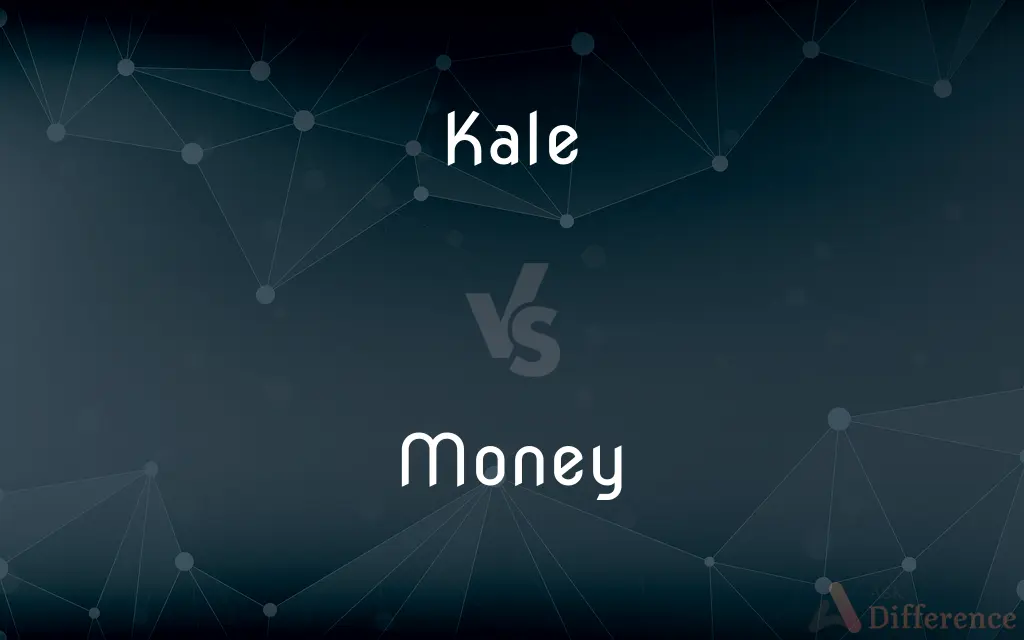Kale vs. Money — What's the Difference?

Difference Between Kale and Money
ADVERTISEMENT
Compare with Definitions
Kale
Kale (), or leaf cabbage, belongs to a group of cabbage (Brassica oleracea) cultivars grown for their edible leaves, although some are used as ornamentals. Kale plants have green or purple leaves, and the central leaves do not form a head (as with headed cabbage).
Money
Money is any item or verifiable record that is generally accepted as payment for goods and services and repayment of debts, such as taxes, in a particular country or socio-economic context. The main functions of money are distinguished as: a medium of exchange, a unit of account, a store of value and sometimes, a standard of deferred payment.
Kale
A hardy cabbage of a variety which produces erect stems with large leaves and no compact head.
Money
A medium that can be exchanged for goods and services and is used as a measure of their values on the market, including among its forms a commodity such as gold, an officially issued coin or note, or a deposit in a checking account or other readily liquefiable account.
Kale
Money.
ADVERTISEMENT
Money
The official currency, coins, and negotiable paper notes issued by a government.
Kale
A plant (Brassica oleracea var. acephala) in the mustard family, having dark green, spreading, usually crinkled leaves that are eaten as a vegetable. Also called borecole, cole, colewort.
Money
Assets and property considered in terms of monetary value; wealth.
Kale
(Slang) Money.
Money
Pecuniary profit or loss
He made money on the sale of his properties.
Kale
An edible plant, similar to cabbage, with curled leaves that do not form a dense head (Brassica oleracea var. acephala)
Money
One's salary; pay
It was a terrible job, but the money was good.
Kale
Any of several cabbage-like food plants that are kinds of Brassica oleracea.
Money
An amount of cash or credit
Raised the money for the new playground.
Kale
(cooking) Broth containing kale as a chief ingredient.
Money
Often moneys, monies Sums of money, especially of a specified nature
State tax moneys.
Monies set aside for research and development.
Kale
Money.
Money
A wealthy person, family, or group
To come from old money.
To marry into money.
Kale
A variety of cabbage in which the leaves do not form a head, being nearly the original or wild form of the species.
Money
A legally or socially binding conceptual contract of entitlement to wealth, void of intrinsic value, payable for all debts and taxes, and regulated in supply.
Kale
See Kail, 2.
Money
A generally accepted means of exchange and measure of value.
I cannot take money, that I did not work for.
Before colonial times cowry shells imported from Mauritius were used as money in Western Africa.
Kale
Informal terms for money
Money
A currency maintained by a state or other entity which can guarantee its value (such as a monetary union).
Money supply;
Money market
Kale
A hardy cabbage with coarse curly leaves that do not form a head
Money
Hard cash in the form of banknotes and coins, as opposed to cheques/checks, credit cards, or credit more generally.
Kale
Coarse curly-leafed cabbage
Money
The total value of liquid assets available for an individual or other economic unit, such as cash and bank deposits.
Money
Wealth; a person, family or class that possesses wealth
Money
An item of value between two or more parties used for the exchange of goods or services.
Money
A person who funds an operation.
Money
A piece of metal, as gold, silver, copper, etc., coined, or stamped, and issued by the sovereign authority as a medium of exchange in financial transactions between citizens and with government; also, any number of such pieces; coin.
To prevent such abuses, . . . it has been found necessary . . . to affix a public stamp upon certain quantities of such particular metals, as were in those countries commonly made use of to purchase goods. Hence the origin of coined money, and of those public offices called mints.
Money
Any written or stamped promise, certificate, or order, as a government note, a bank note, a certificate of deposit, etc., which is payable in standard coined money and is lawfully current in lieu of it; in a comprehensive sense, any currency usually and lawfully employed in buying and selling.
Money
Any article used as a medium of payment in financial transactions, such as checks drawn on checking accounts.
Money
Any form of wealth which affects a person's propensity to spend, such as checking accounts or time deposits in banks, credit accounts, letters of credit, etc. Various aggregates of money in different forms are given different names, such as M-1, the total sum of all currency in circulation plus all money in demand deposit accounts (checking accounts).
Money
In general, wealth; property; as, he has much money in land, or in stocks; to make, or lose, money.
The love of money is a root of all kinds of evil.
Money
To supply with money.
Money
The most common medium of exchange; functions as legal tender;
We tried to collect the money he owed us
Money
Wealth reckoned in terms of money;
All his money is in real estate
Money
The official currency issued by a government or national bank;
He changed his money into francs
Share Your Discovery

Previous Comparison
Melancholy vs. Solitude
Next Comparison
Chlorine vs. Chloramine















































